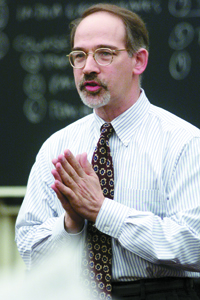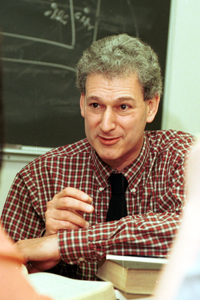Chicago in the News
The Chronicle’s biweekly column Chicago In the News offers a digest of commentary and quotations by a few of the University faculty members, students and alumni who have been headlining the news in recent weeks. Chicago faculty members are some of the most frequently quoted experts, so space allows publishing references to only selected examples. To read many of the full newspaper articles mentioned in this column, visit the In the News column at the University News Office Web site: http://www-news.uchicago.edu.
 James Schrager |
|
Doubts about black vote
Michael Dawson, the John D. MacArthur Distinguished Service Professor in Political Science and the College, was interviewed for articles that reported how presidential candidate Barack Obama is addressing racial inequities in America while he is on the presidential campaign trail and where he stands among black voters. According to a Sunday, Jan. 13 Baltimore Sun story, race could become an issue for Obama’s bid for the Democratic nomination and the general elections, even though many African Americans support him. “A substantial number of black people do think he will win the nomination and the general election,” said Dawson, but “the doubts certainly linger” about his electability. A Thursday, Jan. 24 Los Angeles Times story reported that Obama was changing his campaign strategy and directly addressing racial issues while campaigning. That story cited Dawson’s research on racial attitudes in America after Hurricane Katrina, in which nearly 80 percent of black respondents to a study said America would not achieve racial equality in their lifetimes—if ever.
Sears’ lack of strategy
James Schrager, Clinical Professor of Entrepreneurship and Strategic Management in the Graduate School of Business, commented on the retail strategy of Sears Holdings Corp. since Edward Lampert took over its marketing and merchandising in 2005. The 121-year-old retail chain is losing profits to other retailers such as Wal-Mart and Target, according to a Tuesday, Jan. 29 Chicago Tribune article. Schrager said, “Sears’ latest actions are more evidence that they don’t have a strategy. A strategy is a way you get people to come into the store and buy stuff. It’s not strategy if you bring in new management. I think Lampert is realizing he is failing badly, and he is changing what he can change.”
Burnham’s influence on the city
Crain’s Chicago Business interviewed Neil Harris, the Preston & Sterling Morton Professor in History and the College, to hear his views on city planner Daniel Burnham’s influence on Chicago, a topic Harris wrote about as a contributing author to the 1993 book Grand Illusions: Chicago’s World Fair of 1893. Harris was asked: What was it about Burnham’s approach to planning that worked? “He knew how to dramatize his ideas. The World’s Columbian Exposition showed the power of creating an environment that was beautiful and coherently organized. It was called a heavenly city, a paradise. The phrases that were used were quite rhapsodic. The demonstration had a profound effect on visitors who realized the same principles could be applied to permanent cities.”
Addressing addictions
University researchers are testing to see if the drug naltrexone, used for alcohol and heroin addictions, might also help women quit smoking. Because women are more prone to depression, which can make quitting more difficult, and because they fear gaining weight if they quit, “naltrexone may give them the break they need,” said Andrea King, Associate Professor in Psychiatry, who specializes in treating addictions. Researchers leading the Chicago Stop Smoking Research Project at the University hypothesize that naltrexone will improve rates women quit, but not men. Up to 300 men and women will be selected for the study, which was reported in the Monday, Jan. 28 Chicago Sun-Times story.
Explaining the problems of physics
Physicists at the University are launching a $1.8 million study of catastrophic deformation with a W.M. Keck Foundation grant, which was reported in the Chicago Tribune Tuesday, Jan. 29. Three University physicists, Sidney Nagel, the Stein-Freiler Distinguished Service Professor in Physics and the College, Wendy Zhang, Assistant Professor in Physics and the College, and Margaret Gardel, Assistant Professor in Physics and the College, were quoted in the story. “Physics is really good at explaining problems that are linear, with clear borders, where all the forces are local,” said Nagel. “But so much of everyday life is governed by systems that are not linear, not bordered, and not in equilibrium. Right beneath our nose there can be a deep physics problem.” Zhang discussed the problem of learning why liquid splashes, while Gardel discussed the smallest scale of living cells.
Beckett’s the MVP of gloom
A Chicago Tribune article, which appeared in the Sunday, Jan. 27 edition, suggested that gloom and doom has lately been invading the arts, and has been evident in television shows, films and the theater. David Bevington, the Phyllis Fay Horton Distinguished Service Professor Emeritus in Humanities and the College, and a scholar of Shakespeare, commented on a current renaissance of the dramatist Samuel Beckett, who, according to the Chicago Tribune article is the “most valuable player, if gloom’s the game.” “We had a marvelous production of ‘Endgame’ at Court Theatre years ago, but we discovered that many people were simply not willing to put up with this play,” said Bevington. “They were ostentatiously bored, and some left at the half. There’s a push-pull with Beckett. People interested in serious theater think he’s worth the effort. But others complain he’s hard to follow, repetitive or anti-common sense. But all his dramas delve deeply into the question of whether there’s a God and what to do if there isn’t. There’s heartache there. His is a view we shouldn’t ignore.”
 Michael Silverstein | |
Lacking sex education
Stacy Tessler Lindau, Assistant Professor in Obstetrics & Gynecology, was quoted in a Thursday, Jan. 31 Chicago Tribune story about a current study that reported a lack of qualified teachers to instruct students in sex education. “Schools are an important place where young people get information about health, including sexuality, but we are seeing serious and troubling holes in that education,” said Lindau. “Doctors need to be proactive and initiate discussion about sexuality with adolescents and their parents. Accurate knowledge is power.” Lindau also was interviewed for Chicago Sun-Times article, which was published Thursday, Jan. 31.
Perfect!
Michael Silverstein, the Charles F. Grey Distinguished Service Professor in Anthropology and Linguistics, was quoted in a Monday, Jan. 28 Chicago Sun-Times story that described how the word “perfect” is becoming a replacement for “awesome” and the common “thank you” in the public lexicon. Used to define something that is completed, said Silverstein, “It’s an end point on an evaluative scale, not merely good, better, best.” There are other variant forms, and they can become almost slang, the article noted. “Linguists have discovered this interesting tendency toward moving to these extremes when you want to give an emotional evaluation, which are not literally true or defensible, but you say them anyway,” said Silverstein.
![[Chronicle]](/images/sidebar_header_oct06.gif)